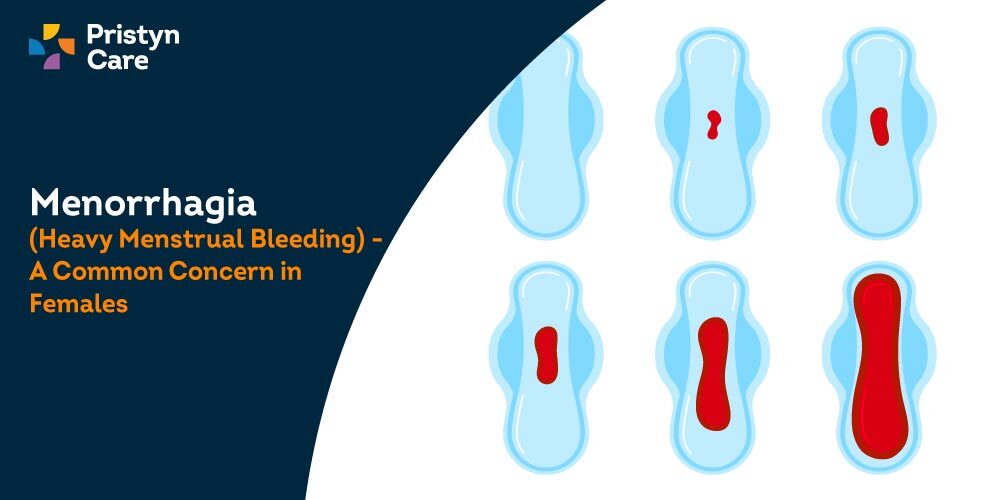
Table of Contents
What is menorrhagia?
Menorrhagia is the medical term for abnormally heavy or prolonged menstrual bleeding. Although heavy bleeding is a fairly common condition, some indicative definite factors separate usual heavy bleeding from menorrhagia.
Heavy period bleeding is common, affecting anywhere from 27% to 54% of people who menstruate. (Source – Cleveland clinic).
The condition is referred to as menorrhagia when an extremely heavy period lasts longer than a week, or you lose more blood than in typical menstruation. In menorrhagia, you may bleed so much that you must change your tampons and sanitary pads for several hours. You may also have menorrhagia if you pass quarter-size or larger blood clots.
You should consult with a gynecologist about changes to your menstrual flow or if you are experiencing symptoms of menorrhagia.
Also read: Why blood clots in periods?
What causes menorrhagia?
Menorrhagia may be caused due to several underlying health conditions. Possible causes of menorrhagia may fall into the following categories:
1. Problems related to the Uterus
- Uterine or cervical cancer
- Use of birth control devices
- Benign growths in the uterus, such as uterine fibroids and polyps
- Ectopic pregnancy (the baby grows outside the uterus) or miscarriage (the baby grows in the uterus)
- Adenomyosis (the uterine lining tissue grows into the muscular wall of the uterus)
2. Hormonal Problems
- Insulin resistance
- PCOD/PCOS
- Thyroid disorders
- High levels of estrogen and low levels of progesterone
3. Other Illnesses and Disorders
- Bleeding-related disorders, such as von Willebrand disease (VWD) or platelet dysfunction
- Pelvic inflammatory disease
- Liver disease
- Kidney disease
4. Medications
Anti-inflammatory medications and hormonal medications such as Warfarin and Lovenox may lead to heavy and prolonged bleeding.
What are the common signs of menorrhagia?
An irregular period is normal for any woman who menstruates. However, menorrhagia differs from the normal variations in menstrual flow.
The bleeding in case of menorrhagia may be so heavy that it interferes with regular life. Signs of menorrhagia may include:
- A period that lasts for seven days or longer
- Soaking sanitary pads or tampons every alternate hour
- Passing significant size blood clots along with the period of blood
- Severe and excruciating abdominal cramps
- Symptoms of anemia, such as tiredness, fatigue, or shortness of breath
- A heavy menstrual flow that affects your regular life
Diagnosis and Treatment of Menorrhagia
Menorrhagia is usually diagnosed and treated by a gynecologist. To diagnose the condition, the doctor may run a few tests and ask you questions to gather more insight about your menstrual cycle and overall health. Before determining the best treatment for menorrhagia, the doctor may ask you to keep track of the symptoms of menorrhagia, such as the frequency of the menstrual flow, the amount of blood clotting, and the intensity of cramping.
The standard diagnostic tests for menorrhagia are:
- Transvaginal ultrasound – The test is used to check uterine abnormalities such as ectopic pregnancy, uterine polyps, uterine fibroids etc.
- Blood tests – Blood tests help detect iron deficiency, thyroid levels, and hormonal imbalances (if any). Blood tests help in identifying and preventing problems related to blood clotting.
- Ultrasound – The gynecologist may do a saline contrast sonohysterography to diagnose malignant tumors, malignant lesions, uterine fibroids etc.
- Biopsy – An endometrial biopsy can detect the presence of abnormal tissue or cancer within the uterine lining.
- Pap test – A pap test can detect cervical changes and inflammation and infection in the cervical lining due to cancerous tissues.
- Hysteroscopy – To check for polyps, fibroids or other irregular tissue in your uterus.
Treatment for Menorrhagia
The treatment for menorrhagia can broadly be classified into 2 categories – medications and surgical procedures. The best treatment for menorrhagia shall, however, depend upon your overall health condition, the cause of heavy bleeding, your future childbearing plans, lifestyle, personal treatment preference, and many more.
1. Medications for Menorrhagia
- Oral progesterone – The hormonal medication can help treat hormonal imbalance and manage menorrhagia.
- NSAIDs – Nonsteroidal anti-inflammatory drugs (NSAIDs) such as ibuprofen help reduce heavy blood loss during menstruation. The drugs can help in relieving painful menstrual cramps too.
- Oral Contraceptives – Oral contraceptive medicines can help regulate menstrual cycles and reduce heavy and prolonged menstrual bleeding.
- Gonadotropin-releasing hormone (GnRH) – The medicine can temporarily stop or reduce bleeding by preventing ovulation.
2. Surgeries to Treat Menorrhagia
If your menorrhagia’s condition does not improve after taking medications, the doctor may suggest surgeries for the treatment of menorrhagia. Some of the standard surgical treatment for menorrhagia are:
- D&C – D&C is recommended for heavy bleeding if the cause is abortion or incomplete abortion. In D&C, the gynecologist dilates the cervix and then, using a curette, scrapes or suctions out the bloody remnants and tissues from the uterine lining.
- Myomectomy – Myomectomy is the surgical removal of uterine fibroids. Depending upon the size, number, and location of the uterine fibroids, the doctor may choose either open abdominal surgery or laparoscopic myomectomy.
- Endometrial ablation – The uterine lining is ablated or destroyed in this procedure. The ablation can be done using a laser, radiofrequency, or heat. The ablation helps in reducing the intensity of periods.
- Hysterectomy – Hysterectomy is the surgical removal of the uterus and in some cases, the cervix and the fallopian tubes too. Hysterectomy is a permanent treatment for heavy menstrual bleeding and is recommended only to women who do not have any plans of childbirth in the future.







